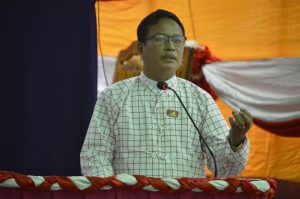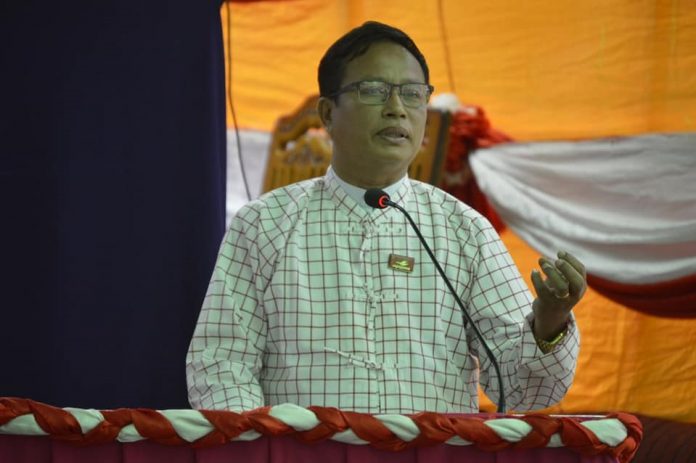Mon News Agency Editor Wonna Marn, interviewed Nai Aung Ma Ngay, PPST spokesperson, and Central Committee member of New Mon State Party (NMSP) regarding the stalled Myanmar peace process.
Question: What was discussed and what decisions were made at the recent Peace Process Steering Team (PPST) meeting?
Answer: The 5th Peace Process Steering Team (PPST) meeting was held in Chiang Mai, Thailand from October 10th to 12th, and 74 persons participated including, members’ leaders, representatives, advisers, technical support, and office staff from the ten ethnic armed groups that are signatories to the National Ceasefire Agreement (NCA).
During the three-day discussions, we discovered that joining the Joint Implementation Coordination Meeting (JICM) for the Nationwide Ceasefire Agreement (NCA) has become crucial. From our side, the official meeting has been on hold for a year. We accepted the government’s suggestion to convene an official meeting before continuing with any informal meetings. However, we also decided to have a preparatory meeting before proceeding with the official discussions.
In this preparatory meeting, we will present what we want. We have already formed a coordinating committee team. This committee has determined our agenda points for the meeting. The main discussion items will be;
i) Obstructions weakening the NCA.
ii) Implementation initiatives we have not yet achieved.
iii) How to implement the federal union.
iv) Event details to celebrate the 4th Anniversary of the Nationwide Ceasefire Agreement (NCA).
All of these points will be presented at the upcoming JICM Pre-Meeting and once we have reached an agreement on these points, we will continue with the formal JICM.
Because the 4th anniversary of the NCA takes place during the Thadingyut full moon day (the Lighting Festival of Myanmar), the anniversary event was postponed until after October 15th. The Sub-committee of the PPST members has been formed to organize this event.
It is our hope at the JICM meeting to get an agreement with the government to —
i) Resolve the stalled NCA process.
ii) Establish the basic principles for the implementation of a federal union and,
iii) Determine what actions should be taken before and beyond 2020.

The current government agreed to allow us to extend the (NCA) process with the new government post-2020. This is an important and fundamental achievement.
Question: Can you comment about what is happening with rural development plans and the National Reconciliation and Peace Centre (NRPC)?
Answer: In September, the government sent us a letter stating we needed to submit our rural development plans to the National Reconciliation and Peace Centre (NRPC). According to the government we are only able to proceed with our rural development plans once the NRPC agrees. However, we feel this is a contradiction of Article 25 of the Nationwide Ceasefire Agreement (NCA). Article 25 of the NCA says that both sides should coordinate for the interests of rural development. So waiting for the NRPC approval should not happen. At the PPST meeting it was decided to refer this matter to the government and President through a letter.
Question: How about the rumor of a terror attack and security warning announcement that came from the President’s office?
Answer: In September, there was a rumor spreading on social media indicating that a confidential letter from the President’s office warned of a possible bomb attacks planned for big cities including Nay Phyi Taw Council areas. The letter alleged that two NCA-signatories, the Chin National Front (CNF) and the Karen National Union (KNU), were involved – this should not have happened. It was a rumor and false news designed to create misunderstanding and doubt amongst the NCA-signatories, the government, and the Tatmadaw. We at the PPST strongly oppose such false news.
Question: What is the discussion regarding the existence of conflict in some areas while holding peace talks?
Conflicts are escalating in Rakhine and Northern State regions. If there is fighting like this, there can be no peace and stability. We want both sides to decrease the intensity of the conflict because such conflicts hinder the country’s development. We want all sides to get involved in the peace talks. Since all of our ethnic armed groups are joint owners, we all should be included in the peace dialogue. Similarly, political parties, the government, Hluttaw and Tatmadaw should also get involved. Only with understanding, (can the peace talks) become successful. Therefore, we urge all non-NCA signatories to understand and sign the Nationwide Ceasefire Agreement (NCA).
Question: When will be the assembly of the Joint Implementation Coordination Meeting (JICM) for the Nationwide Ceasefire?
Answer:The JICM negotiation team has been formed from our side. We have agreed to call for the JICM meeting but requested to hold a pre-JICM meeting first. The government has been informed, and now we are waiting to hear back from them. The JICM meeting will be able to proceed after obtaining an agreement at the pre-JICM meeting.
Question: In the past, informal talks were held before final discussions began. Could you please explain why have a pre-JICM meeting instead of an informal meeting rather than organizing a JICM official meeting now?
Answer: We have presented our requests to the government at the informal meeting. The government has reaffirmed its points. We also submitted our proposal urging for measures to resolve the stalled NCA process and to advance the federal union issue.
The government has responded with what they want to do. To date, we have had a lot of informal discussions, which has generated many acceptable points, and there must be a JICM meeting to confirm these agreements. The government wants a formal meeting before an informal meeting. There has been a series of informal meetings recently, and the public, domestic organizations, and international organizations have lost their confidence on both sides. To restore trust, we have agreed to have a JICM official meeting.
Nevertheless, the government will agree to have the pre-Meeting to avoid any potential disputes with each other during the JICM meeting. The pre-meeting will allow the respective committees to collect agreements from both sides, and share them with the JICM meeting. Then, the leaders from both sides will need to approve those agreements.
Detailed plans may emerge while negotiating the agreements, for example, Union Peace Conference convention matter. To put it simply, holding the JICM meeting is the key to hold the fourth session of the 21st Century Panglong Union Peace Conference. In that meeting, we have to agree with the government on what we want. Also, a new government will be accountable to continue to implement the decisions from the conference.
Question: Lastly, is there anything else you would like to add regarding the peace process?
Answer: Yes, as everyone knows the current situation of our country, we are no longer the same as other countries. We gained independence at the same time as other countries, but our country has been left behind.
When we solve political issues, we have to solve issues for all sectors — ethnic groups, political parties, government, parliament, and the Tatmadaw. All groups must have a true willingness to achieve peace. The peace process will only be successful with determination. Therefore, I would like to urge the ethnic peoples and experts to be included in the peace process for Myanmar.

